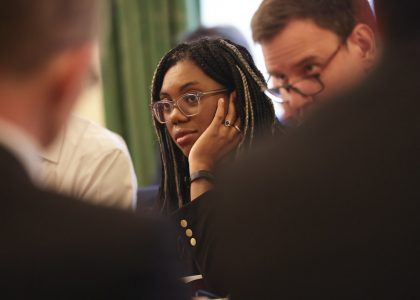Electoral participation remains low amongst young people. In this blog, Beth Davies draws from focus groups with young people to reveal what can be done to get the youth vote out.
The Oxford Dictionary’s 2017 word of the year was ‘youthquake’, a term previously coined for the 1960s’ British flair for fashion and music, which has now turned its hand to politics. Nobody could have anticipated the surge in youth turnout that would occur in the UK 2017 General Election. In just two short years since the 2015 General Election, turnout in the youth demographic increased. However, there is much more to be done. As YouGov noted:
Despite an increase in in youth turnout, young people are still noticeably less likely to vote than older people. While 57% of 18 and 19 year-olds voted last week, for those aged 70+ the figure was 84%.
New Findings from Focus Groups in Norfolk
Why aren’t young people turning out to vote? Qualitative research carried out as part of a report that I wrote as part of UEA’s Parliamentary Research Scheme shows that the youth feel disconnected from traditional politics. Focus groups were undertaken with students in Norfolk schools to ascertain why they and their peers are sometimes indifferent towards politics.
The perception of MPs was one factor. One participant described MPs as “pale, male, stale” and therefore obviously unrepresentative of the British demographic makeup. Another said that:
“You need more people that are more representative in politics than just people that went to Oxford or Cambridge, and private schools. If you had people like us or people like, who came from a typically lower class getting involved in politics then it would encourage more youth to get involved, it’s almost like there’s this barrier up which seems uncrossable”.
Politicians can also appear to be geographically far removed. They would value it if they were:
talking to kids all over the country instead of just one place. Most of the parties just talk to kids in London and you don’t really hear of politicians, major politicians coming to Norwich or Lowestoft or Great Yarmouth. They just send people to talk on their behalf
Participants also stressed that social media can help politicians reach out to them – but some parties and politicians are not as proactive as others in doing this. The participants tended to specify that the Labour party were more successful in using various social media platforms such as Twitter and Snapchat, the latter of which was a vastly popular social platform for young people in comparison to others which encompass a wider age range. Participants happily disclosed that they had politicians on their Snapchat, portraying that if political figures are willing to connect with young people on digital platforms that young people will respond. One participant was vocal in the benefits of using a digital platform, arguing that parties should work better to involve themselves and that they:
weren’t really using it… when it’s what everybody uses
The participants stressed that celebrities and other public figures could have a vast level of influence over young people, which can be utilised to positive effect. Whilst it is recognised that there are celebrities who run for office such as Donald Trump, Kanye West or Dwayne ‘The Rock’ Johnson, as one participant notes, there is a distinct line between celebrity politicians and political celebrities. Investment has already been made by individuals towards a certain artist, so for that public figure to stress political participation then this can enhance democracy because the idolisation by the member of the electorate will encourage them to do so. This is because “people might not actually know what they’re voting for” and therefore if a celebrity is voting a certain way then it may encourage their followers to also do so.

Of course, there are other ways in which the youth demographic can further political parties’ success. The addition of political education to the school curriculum was argued for. There was also clear confusion and/or distaste shown for the system of electoral registration, as participants are either unaware of how to register or would prefer an easier system. Under individual electoral registration everyone is required to register themselves. As one participant put it: “our mums and dads can do it for us on our behalf, can’t they?”
There is therefore a lot more that can be done to increase voter participation to ensure a genuine youthquake.
Image Credit: Adam Scotti
Beth Davies is a third year undergraduate student who took a placement on the Parliamentary and Public Policy Research Placement at UEA.





